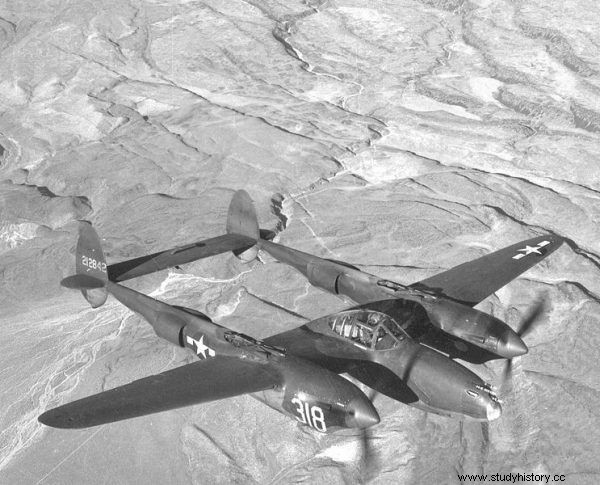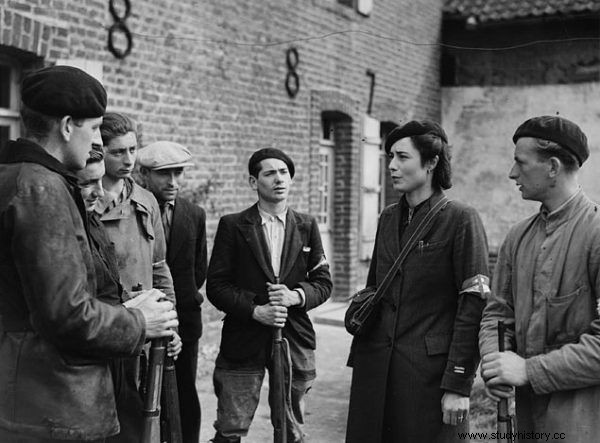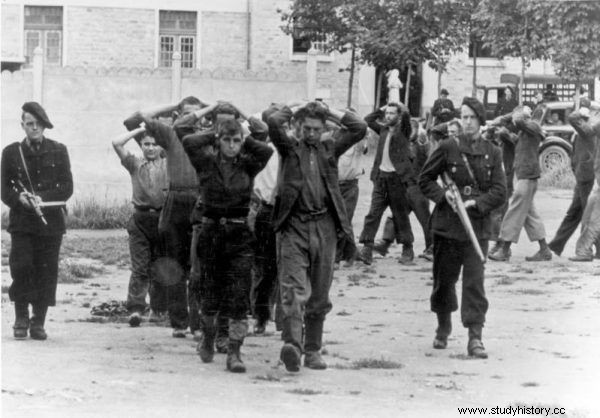A damaged fighter wing, a parachute on the top of trees, bruised ribs ... And a break through France on ... a bike and problems with the front wheel. Let's add the lack of knowledge of the language and setting a cigarette on fire ... to a German soldier and we will get material similar to the action of the movie "How I Unleashed World War II".
Colonel Henry Bansk belonged to the USAAF 429 Squadron. This squadron was established in 1943 in Southern California. He made his first touches in the sand and gravel Mojave Desert, mostly in eastern California. After the training phase, he was transferred to Europe, where from March 1944 he was delegated as part of the 9th Air Force in England.
Damaged wing
Henry Banks was the pilot of the P-38 (Lockheed P-38 Lightning - American fighter). Its mission was to cover bombers whose task was to bomb German targets in occupied France. On July 27, 1944 he took off from England:
Right on Laval (city in western France) we spotted about 50 Me 109 fighters (Messerschmitt Bf 109). Our bombers dropped their payloads and we were getting ready to attack .

P-38 Lockheed Lightning
Banks turned left to follow his formation commander. At the same time the P-38 with its beak painted yellow appeared right behind it:
I noticed him too late and his right wing caught my right wing. Part of my wing broke off and the aileron controls stuck.
Banks' plane began to make airborne propellers. Sooner, he informed the commander that I was getting ready to evacuate.
Unfortunately, I got tangled in the radio cables and therefore could not leave the cabin. Eventually, as I fell into a dense cloud layer at an altitude of about 5,000 feet (1,524 meters), I was able to get out of the tangled cables.
Banks got outside and immediately pulled the string of his parachute. This one caught on two pinnacles so the pilot hovered about 20 meters above the ground.
I tried to swing to catch one of the trees blocking me, but one of the parachute's binders started to creak dangerously, so I stopped trying. Banks had no choice but to unhook himself.
It plunged down hard.
Injury and start of escape
He fell on his back. I felt that my ribs were damaged. I was unable to move for 20 minutes. Eventually he motivated himself and stood up. He turned east, where he threw away his helmet and the remains of his parachute, and began walking north-west. He passed two farms while walking through the woods. At three, he noticed five farmers who were clearly looking for something. Having no idea whether he could trust them or not, he continued on his lonely journey. They finally found him:
They asked if I was American and I asked them for some things to change. They brought me civilian clothes and almost immediately we heard voices and dogs barking behind us. They led him through the forest. After about 9 kilometers, they reached a house of some sort. There they explained to him that I should hide in it until the war is over. I protested and asked them to send me someone who spoke better English.
Later that evening, an English-speaking man came. He took him to his home in a neighboring village. He asked me to stay there, but I swore that I wanted to return to my own and continue my military service. For two days he stayed with him, practically never leaving the bed. On the third day, early in the morning, he noticed through the window two German soldiers walking down the street. It was at this point that I made the decision to run away. In the afternoon, the host provided him with appropriate clothes, gave him money and some food. He also gave Banks a bicycle. He moved on!
By bike through occupied France
Around 8 o'clock in the evening he had a flat tire in the front wheel, exactly in a town crowded with SS soldiers. Banks went to a shop on the outskirts of town, which he mistook for a bicycle shop.
As soon as he told the owner that he was American, he immediately sent for an English-speaking woman. The woman took the flat tire and the people in the store let him stay and fed him. Then they took him to their garage, where he spent the night reasonably safely, sleeping on a pile of hay.
At 7am my bike was repaired so I continued my journey.
Unfortunately for Banks, he had to move along the road with a German military column. He had problems with the front wheel almost all day. In the evening it lost its air again so that it could not be repaired anymore.
I went to a house located on the side of the road. After I explained to the owner who I was, he took me to another house somewhere on the hill.
There, Banks was given an overnight stay. The next morning, he found a store selling tires. His owner sold him the last one that came from his own bike. I paid a very exorbitant price for it.

Maquis (resistance movement) in Wimille, September 14, 1944
Without any temporary problems, he was able to continue his journey until 2 noon. It was then that he arrived in a town where his front wheel had broken down again. He walked through the center and found a repair shop on its southern shores. Only the owner was in it, so Banks went to him and said he was an American aviator.
Hearing that, he immediately slammed the door behind us and vigorously began to shake my hand. He started repairing my bike, but with a badly damaged inner tube, he couldn't do much.
Banks asked him to keep his bicycle until he found a new tire.
Made in England
Banks went downtown again and waited in front of one of the cafes. Suddenly, a German soldier riding a bicycle appeared in front of her.
I waited until he was inside, then without thinking I stole his bike and drove it to the garage.
On site, it turned out that the German tires were of a different size to those on his bike. However, he was afraid to take a longer journey on a stolen bicycle. So there was nothing for him to do but go back to the cafe area and wait for another bike. After less than 5 minutes, he noticed a German soldier. He rode a bicycle different from the previous one. He parked it right in front of the entrance. Banks started walking towards him, but the German instead of entering the cafe turned and started walking towards him.
He started talking to me. Of course, I didn't understand any of his monologue, waved my arms helplessly and said "non comprise" (literally meaning misunderstood, so Banks used the female form) which was the pinnacle of my French.
The German took a tobacco box out of his pocket and began to shake a cigarette from it. He brought his tip closer to Banks, which meant he was just asking for fire.
I took a matchbox out of my pocket, took out one and started to prepare for firing it, when suddenly…, I noticed a big "Made in England" sign on it, covering almost the entire side of the box. I was pretty sure he had noticed the sign, too, so I was prepared to kick it with all my might and just run away.
There was no tragedy. The German calmly accepted the fire proposed by Banks and said "Merci". He turned and headed to the cafe.
Still in full shock, I waited until he calmly sits down inside and begins to deal with the beer placed in front of him. Then I took his bike and drove it straight to the garage.
There, Banks noticed a few other people. The man in the garage told him that he no longer had to cycle towards Spain because they would help him. Since then his escape was organized by the French who were willing to help ..
Support
Banks was taken by car to Barrou, where he found himself on a farm run by a dairy man in the neighborhood. This man, his wife and 20-year-old son belonged to the underground. Thanks to them, Banks was sent to a partisan camp. First, however, he stayed with them until August 3 to rest a bit. Then Banks was taken by car a few kilometers from the farm, where the right people were waiting for a long time in the field. Finally, a group of six guerrillas dressed in British uniforms, armed with a bazooka and five Sten submachine guns appeared. They took Banks to their camp, where he met a French captain and an interpreter who had lost two fingers and a thumb in his left hand during the war. Banks was taken to the partisan command location on the outskirts of St. Barbant. There he met Captain Samuels, who assured him that he would arrange his return.

Police officers escorting captured FFI fighters, July 1944
On August 6, Banks went with Captain Samuels and his squad to the Villemont area. There, Samuels left Banks, who went with a group of several soldiers to another guerrilla camp about 20 km south of Villemont. They were in the care of Captain Gill. Finally, on August 10, just after midnight, the C-47 (The Douglas C-47 Skytrain or Dakota, a military transport converted from the civilian Douglas DC-3) landed in the area. Banks, along with four Americans and three Britons, were taken to Northampton, England. They got there at 5 am.
Report
Once Banks was back in his midst, he reported the following observations to HQ:
On July 31, Banks spotted 50 five-ton trucks, 30 reconnaissance vehicles, and 25 tanks parked on the side of the road. All vehicles were very well camouflaged. There were no visible plots and no personnel hidden behind a camouflage net.
At 1 p.m. on the same day, Banks noticed five mobile stores belonging to an armored division. They were all painted with the emblems of the Red Cross. Two more scout cars, also disguised as the Red Cross, reached them. The soldiers did not resemble the representatives of the Red Cross. They wore the typical gray uniforms and carried weapons.
On August 1, Tours was full of SS and French Militia soldiers. All nearby bridges were surrounded by German guards equipped with machine guns and hand grenades. One bridge connecting Chateau-La-Valliere with Tours has been blown up.
Henry Banks continued to serve on his return and completed a total of 32 air missions during World War II.
